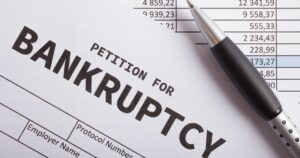The length of the foreclosure process varies by state. Some states take as long as two years before requiring homeowners to move out of their homes. COVID-19 assistance might be available for you. In addition, bankruptcy could help you avoid or delay foreclosure.
When a homeowner cannot pay his mortgage due to extended unemployment, severe illness, divorce, or death of the head of household, their mortgage lender starts foreclosing on his home. After the homeowner misses one payment, lenders typically contact the owner via mail. If the homeowner misses the next three payments (four payments in total), they default on their mortgage loan.
The lender mails a notice of default letter detailing their intent to foreclose on the home if the homeowner doesn’t pay the full amount of past-due payments within 90 days. Finally, the lender petitions the court to start foreclosure proceedings on the property if the homeowner fails to catch up on past-due payments.
Options for Homeowners Facing Foreclosure
Short sale
Before a mortgage lender notifies the court of an intent to foreclose on a property, homeowners behind on mortgage payments could ask their lender about a short sale.
Mortgage lenders may agree to a short sale if the market value of a home no longer covers the mortgage. For example, Mary and Bob bought their house for $100,000 several years ago. However, home values in their neighborhood have decreased significantly since then. The current market value of their home is now only $75,000. When Bob lost his job as a tool and die cutter, he became severely depressed and required hospitalization. Unable to make house payments for the past six months, Mary asked her mortgage lender about a short sale due to hardship.
Short sales involve a lender selling a home for at least its market value and using the proceeds to absolve the remaining debt on the mortgage loan. In other words, Mary and Bob won’t have a foreclosure damaging their credit, but they won’t reap the benefits of owning or selling their home.
Deed in Lieu of Foreclosure
Mary and her mortgage lender could agree to a deed in lieu of foreclosure. In this case, Mary simply gives the deed to her home to the lender. This allows the lender to release the lien on the home for the purpose of selling or renting the home to recoup some or all of the lender’s losses.
Another option Mary might consider is filing for bankruptcy to temporarily stop foreclosure.
What Homeowners in Foreclosure Can Expect After Filing for Bankruptcy
Once an attorney files for bankruptcy on behalf of a client in foreclosure, the filing immediately establishes an injunction called an automatic stay. Ordered by a bankruptcy court upon receiving a petition for bankruptcy, an automatic stay stops the foreclosure from proceeding. It also stops creditors and garnishments from continuing with collection processes. Homeowners can legally file for bankruptcy just hours before a foreclosure auction sale takes place. Mortgage lenders must call off the sale as soon as bankruptcy is filed.
Foreclosures on mortgages owned by Freddie Mac, Fannie Mae, or other federal mortgage lenders often take up to two years to complete. Due to the COVID-19 pandemic, homeowners with these types of mortgage loans have a variety of options provided by the Federal Housing Administration (FHA) or the Department of Housing and Urban Development (HUD).
Chapter 7 vs. Chapter 13: What Homeowners in Foreclosure Should Know Before Filing for Bankruptcy
Chapter 7
Chapter 7 bankruptcy won’t stop a foreclosure but will eliminate mortgage liability and stop a deficiency balance from damaging a homeowner’s credit score. Some states permit lenders to sue foreclosed homeowners for the amount remaining on the mortgage after the lender sells or auctions the home. In other words, if homeowners owe more on their mortgage than their house is worth, filing Chapter 7 will protect them from being liable for a deficiency balance.
Another benefit of filing Chapter 7 during a foreclosure is the automatic stay. Uncontested Chapter 7 bankruptcies generally take four to six months to complete. When an automatic stay is in effect, foreclosure sales cannot be initiated. Moreover, mortgage companies and bill creditors may not harass the homeowner with phone calls or letters demanding payment. Many homeowners in foreclosure choose to file Chapter 7 bankruptcy because it provides extra time for them to find another place to live while stabilizing their finances.
Chapter 13
Homeowners often fall behind on mortgage payments due to uncontrollable events, such as unexpected job loss, illness, or death in the family. When a homeowner cannot pay their mortgage for one year but regains the ability to start making payments again, Chapter 13 bankruptcy is the best option.
For example, let’s say Mary and Bob missed mortgage payments for 10 months. The amount they owe is $10,000. However, Bob regains his health and begins working part-time. Mary finds a full-time job working remotely as a medical coding specialist. Although they can now afford to make monthly mortgage payments, they cannot afford to pay their mortgage company a lump sum of $10,000.
By filing Chapter 13, Mary and Bob’s mortgage arrearage is rescheduled as manageable payments spanning three to five years. As long as they keep current with regular and past-due mortgage payments, Mary and Bob avoid foreclosure.
Filing for Bankruptcy Before Lenders Schedule a Foreclosure Sale
Loan Modification
Filing for bankruptcy establishes an automatic stay which gives owners time to modify their loan. Mortgage loan modifications lower interest rates and extend the time for repaying a balance. Although a loan modification can stop a foreclosure, it may impact your credit score. However, it does not reduce credit scores as drastically as foreclosures do.
Refinancing a Loan
Refinancing a mortgage means the owners of the mortgage are exchanging their old mortgage for a new one. The new loan is intended to pay off the old mortgage while benefiting the homeowner with a lower interest rate and reduced monthly payments. Homeowners facing financial issues that make it difficult to meet monthly payment obligations might consider refinancing their loan long before foreclosure is possible.
Filing for Chapter 7 Bankruptcy Before Getting Behind on Mortgage Payments
For homeowners who suddenly experience a long-term financial catastrophe, a Chapter 7 bankruptcy allows them to keep their home, car, and other property essential for maintaining basic living needs. Once Chapter 7 is filed, the bankruptcy court appoints a representative of the court who oversees the case. This “trustee” is responsible for listing all the homeowners’ assets and debts. State and federal statutes designate different exemptions that the trustee must adhere to when determining what property can be liquidated. People who typically file for Chapter 7 bankruptcy owe thousands of dollars in credit card and medical debts that they would never realistically be able to pay off.
The federal bankruptcy code states that debtors with monthly incomes exceeding their state’s median monthly income must take a “means test” to determine if they really need to file for Chapter 7. Homeowners anticipating foreclosure who do not pass this means test may consider filing for Chapter 13 bankruptcy to keep their home.
In either case, our network of bankruptcy attorneys may be able to help. Fill out our contact form today and we can connect you with someone to speak with about your foreclosure options.


